Overview
This article presents ten compelling alternatives to Trello for streamlined project management, featuring tools such as Casy, ClickUp, and Asana. Each of these platforms boasts unique characteristics designed to boost productivity and foster collaboration. For instance, Casy's automation capabilities and ClickUp's customizable workflows are highlighted, showcasing how these tools can effectively meet diverse project management needs. By detailing the strengths of these alternatives, the article illustrates their potential to significantly enhance team efficiency.
Are you ready to elevate your project management experience? Discover how these tools can transform your workflow and drive your team's success.
Introduction
Exploring efficient project management tools is essential for teams striving to enhance productivity and streamline workflows. With a plethora of options available, identifying the best alternatives to Trello can significantly impact how organizations manage their tasks and collaborate effectively. As teams navigate the complexities of modern work environments, the question arises: which tools offer the most innovative features and seamless integration to meet diverse project needs? This article delves into ten compelling Trello alternatives that promise to elevate project management strategies in 2025 and beyond.
Casy: Automate Task Management Seamlessly
Casy is a powerful project management tool that automates workflow management by seamlessly integrating with chat platforms like Slack and Telegram. By capturing key information from conversations, it generates assignments and establishes deadlines without requiring manual input. This automation allows teams to focus on their core activities, significantly reducing administrative costs across various sectors. Furthermore, Casy's built-in methodologies, such as OKRs and the Eisenhower Matrix, empower teams to prioritize tasks effectively. This makes Casy an ideal choice for fast-paced environments, including game development and startups.
Are you tired of the endless administrative tasks that bog down your team? Casy not only streamlines these processes but also enhances productivity by ensuring that everyone is aligned on priorities. With Casy, you can transform your team's workflow, enabling them to achieve more with less effort.
Imagine a work environment where your team can concentrate on what truly matters—delivering exceptional results. Casy's innovative features are designed to facilitate this vision, making it a must-have tool for any startup founder looking to thrive in a competitive landscape.
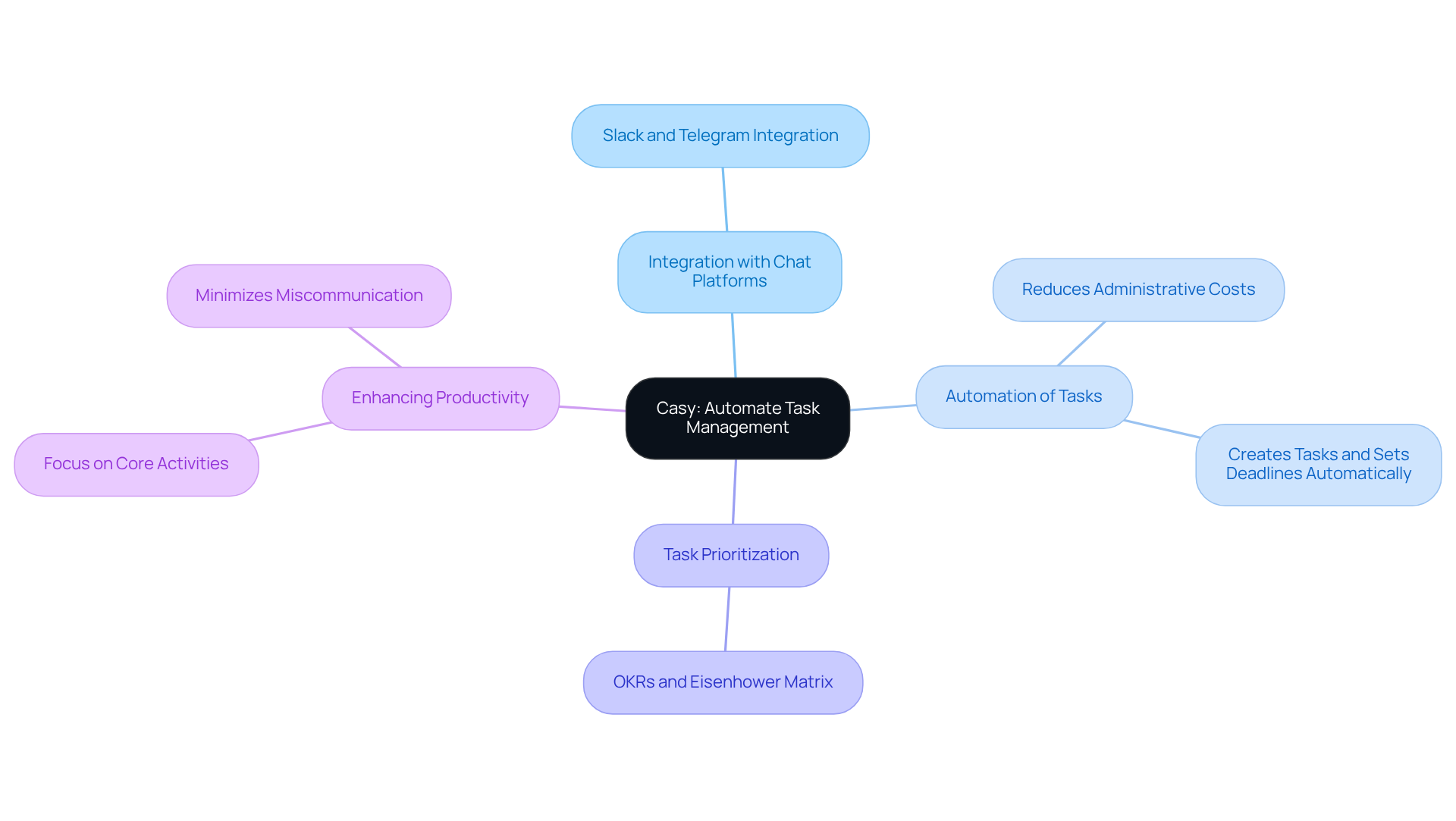
ClickUp: Flexible Project Management for Dynamic Teams
ClickUp delivers an exceptionally adaptable experience for task management, empowering teams to tailor workflows to their specific needs. With robust features like Gantt charts, Kanban boards, and time tracking, ClickUp enables dynamic teams to manage tasks with remarkable efficiency. Its powerful collaboration tools foster seamless communication, making it the go-to choice for organizations striving to enhance their task coordination capabilities. Are you ready to elevate your team's productivity?
Asana: User-Friendly Project Management Solution
Asana stands out as a premier management tool, recognized for its intuitive interface that streamlines workflow. Teams can effortlessly develop initiatives, assign responsibilities, and establish timelines, significantly enhancing their organizational capabilities. Key features such as dependencies and project schedules empower teams to maintain focus on their objectives, ensuring that all members are aligned and informed.
The platform's collaborative features bolster communication, making it an exceptional choice for teams aiming to boost productivity. Asana's recent enhancements, including AI-driven functionalities like intelligent workflows and smart summaries, further simplify task management by automating routine processes. This enables teams to concentrate on strategic initiatives rather than administrative tasks.
Case studies underscore Asana's effectiveness; for example, IPG Mediabrands reported that Asana has empowered their 18,000 employees across 130 countries to streamline processes and reduce unproductive work. This has led to a notable increase in overall productivity and employee satisfaction. With a growing customer base of 21,646 core clients—an 11% increase—and a dollar-based net retention rate exceeding 100%, Asana demonstrates its capacity to meet the evolving demands of modern teams, positioning itself as one of the compelling Trello alternatives.
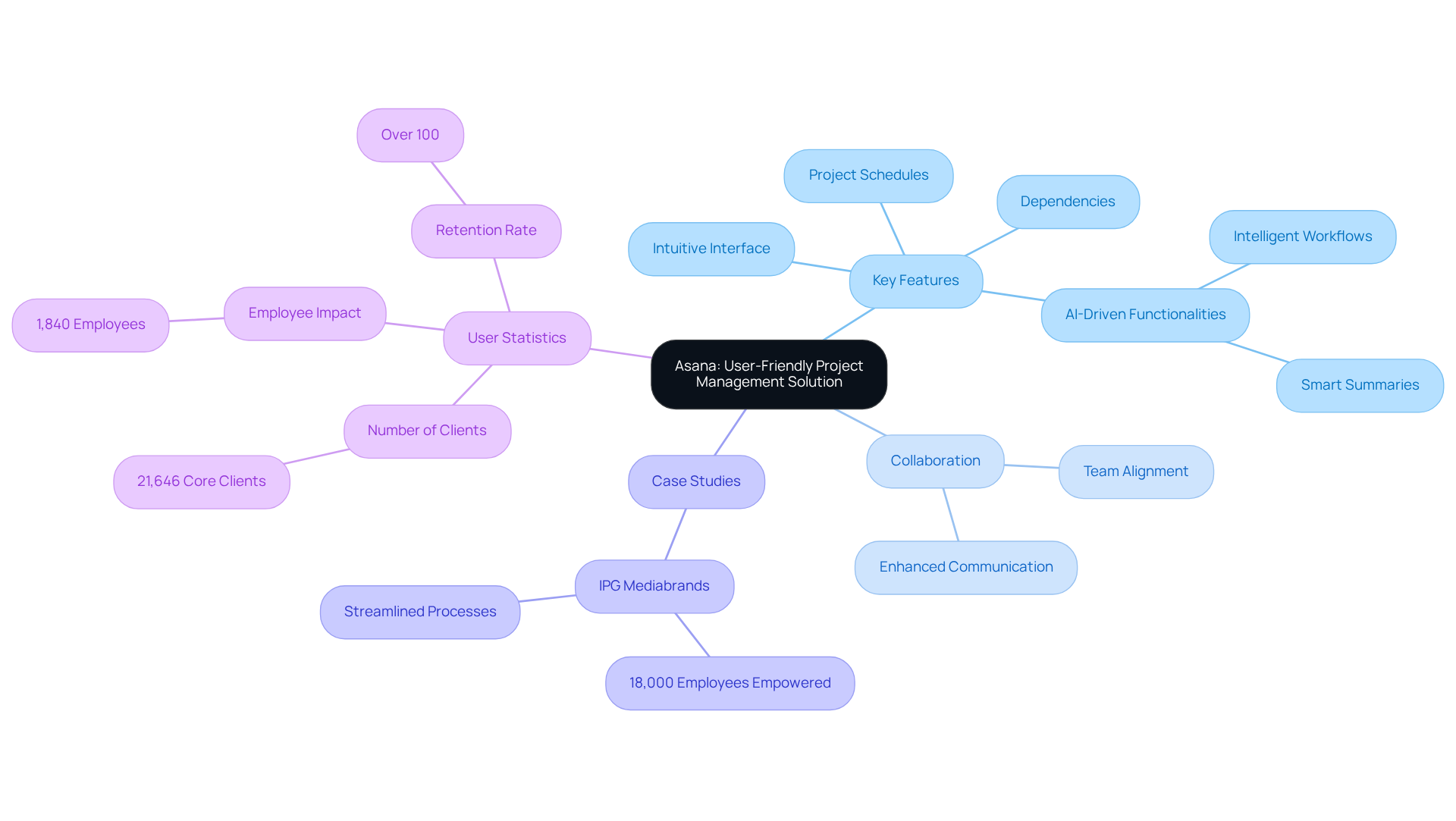
Monday.com: Customizable Workflows for Enhanced Collaboration
Monday.com stands out as a visually appealing platform that empowers teams to design personalized workflows tailored to their specific needs. With its intuitive drag-and-drop interface, project management becomes streamlined, enabling individuals to effortlessly track progress and collaborate effectively with colleagues. The platform's automation features significantly reduce the burden of repetitive tasks, allowing teams to concentrate on higher-priority activities. Moreover, Monday.com integrates seamlessly with a variety of tools, enhancing collaboration and ensuring that projects remain on schedule.
Recent user demographics indicate a growing adoption across diverse sectors, highlighting its versatility in addressing the demands of modern initiatives. As improvements to its collaboration tools continue, Monday.com remains a premier choice for teams aiming to elevate their productivity and visibility. Are you ready to transform your workflow and achieve greater efficiency? Explore how Monday.com can meet your unique project management needs today.
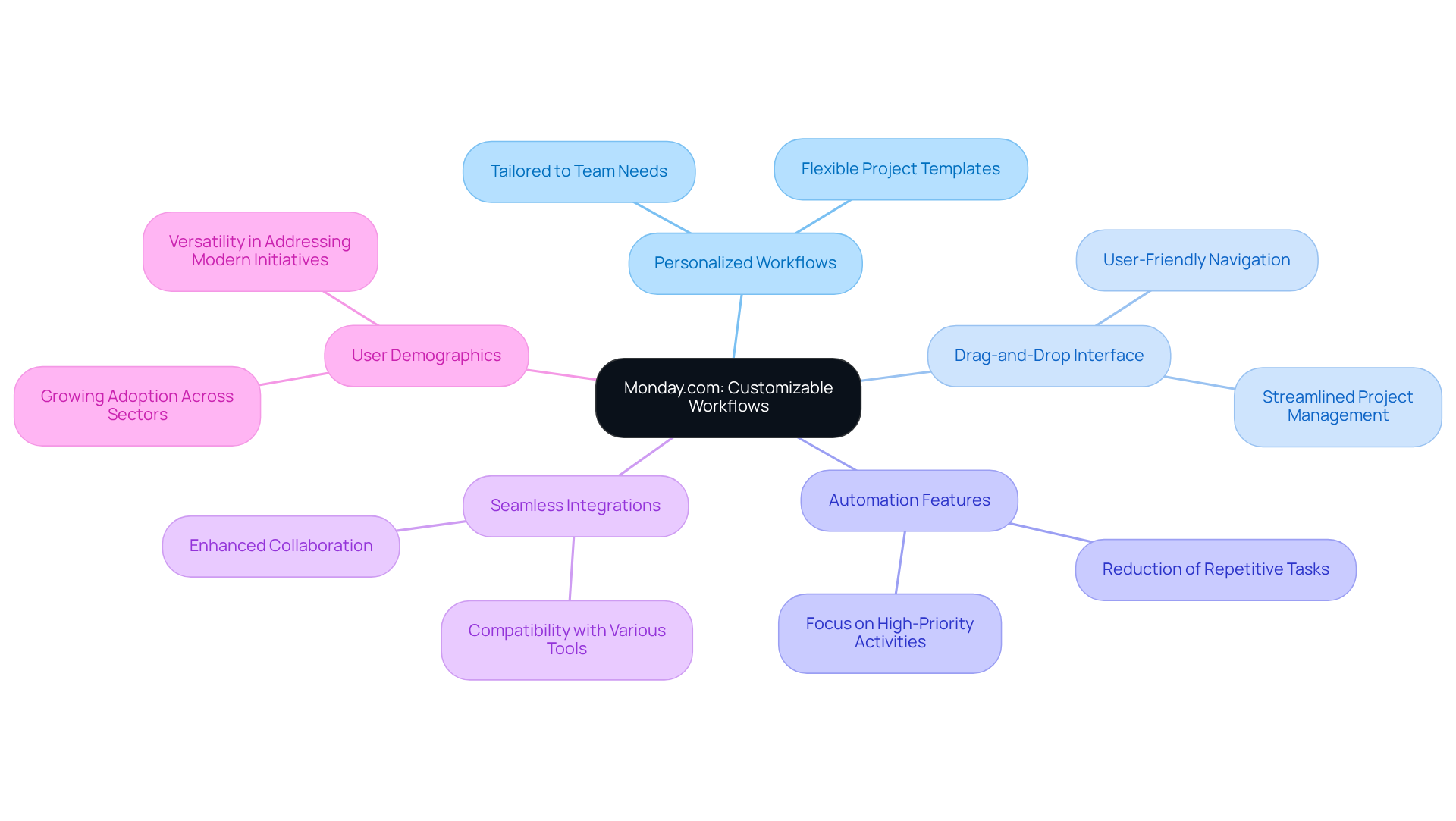
Notion: Versatile Workspace for Project and Knowledge Management
Notion serves as a comprehensive workspace, seamlessly integrating task management with knowledge management. Teams can efficiently create databases, track tasks, and collaborate in real-time. Its adaptability empowers users to design their workflows, making it suitable for various task types. However, performance issues have been reported, particularly when managing large volumes of data, which can hinder the platform's speed. Additionally, Notion's offline mode has proven inconsistent, limiting access to previously loaded pages and potentially obstructing productivity for teams that require constant access.
Originally developed as a platform for organizing ideas, Notion has transformed into a robust project management tool. While its extensive features can significantly enhance group efficiency, they may also overwhelm new users. As teams grow, those outgrowing Notion might need to explore Trello alternatives that offer better management of structured data and complex relationships. Are you ready to evaluate whether Notion meets your team's evolving needs?
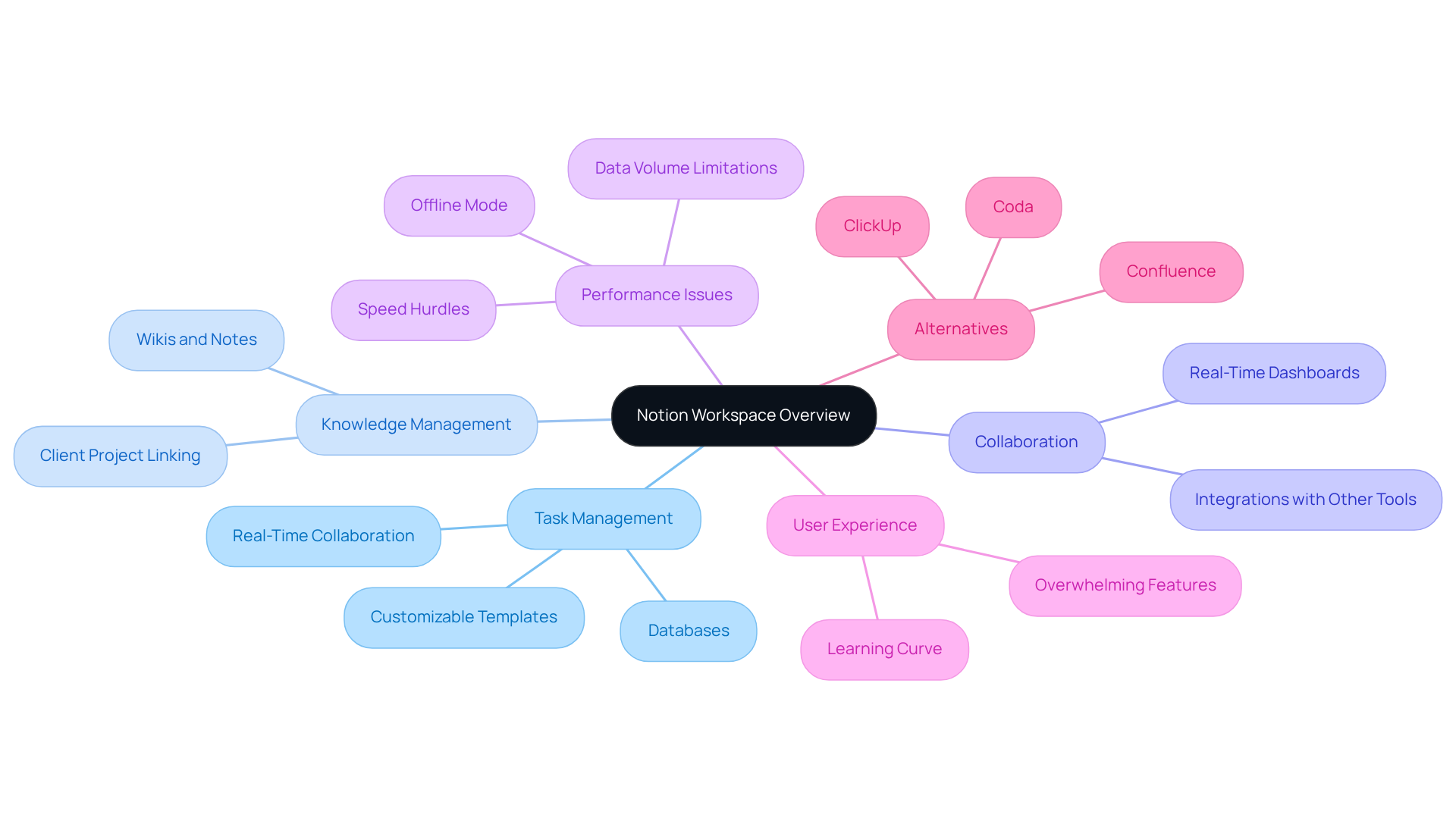
Wrike: Advanced Tracking and Reporting for Complex Projects
Wrike stands out in management with its advanced tracking and reporting capabilities, tailored for teams navigating complex tasks. Users can generate detailed reports that provide a comprehensive overview of progress, resource allocation, and performance metrics. The platform's customizable dashboards offer real-time insights, empowering teams to maintain meticulous oversight and make informed decisions. This functionality is especially advantageous for organizations that require precise management of intricate workflows, ensuring that every facet of the project is monitored effectively.
In contrast, Casy presents a distinctive approach by seamlessly integrating with chat platforms like Slack and Telegram, automatically capturing essential information from conversations to create tasks and establish deadlines. This automation significantly reduces administrative overhead, allowing teams to focus on their core activities. As Benjamin Franklin wisely stated, "Time is a precious resource that should not be squandered," and Casy's features resonate with this principle by enhancing productivity across diverse industries.
As the landscape of task management evolves, tools that are Trello alternatives, like Wrike and Casy, become indispensable for startup founders striving to streamline their workflows and improve outcomes.
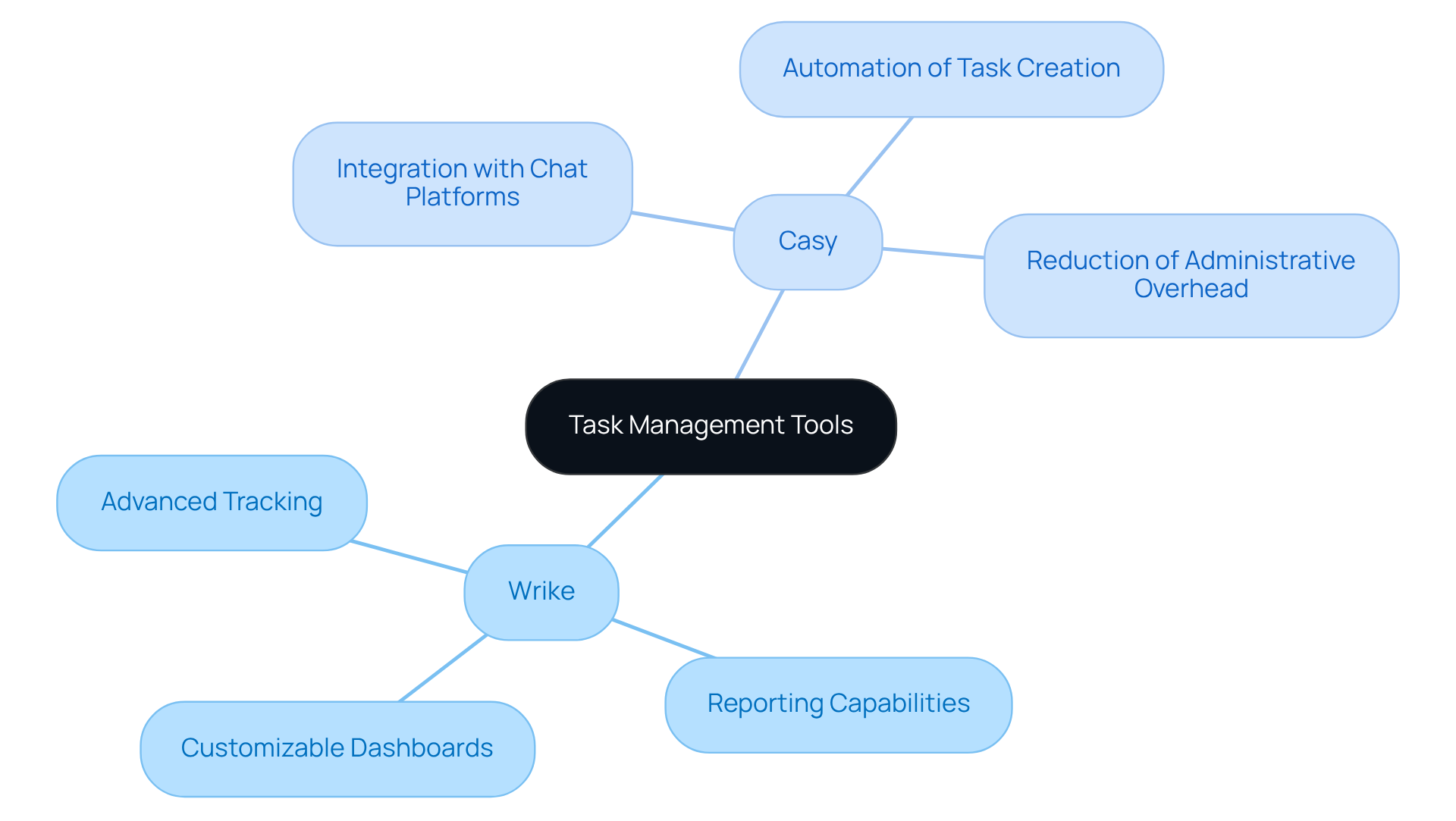
Teamwork.com: Ideal for Client-Focused Project Management
Teamwork.com is expertly crafted for client-oriented task coordination, presenting an array of features that significantly enhance cooperation among groups and clients. Its robust time monitoring, task organization, and reporting capabilities empower teams to complete assignments punctually and within budget. By fostering clear communication, Teamwork.com ensures all stakeholders remain aligned throughout the project lifecycle, cultivating a collaborative atmosphere essential for achieving successful outcomes. This focus on client engagement not only streamlines workflows but also amplifies overall clarity, positioning it as an invaluable tool for teams striving to elevate their client interactions.
Moreover, tools like Casy complement this strategy by automating task creation and integrating seamlessly with chat platforms such as Slack and Telegram. This addresses prevalent challenges, including administrative burdens and miscommunication. As Peter F. Drucker aptly stated, 'Time is the scarcest resource and unless it is organized nothing else can be organized.' This underscores the critical importance of efficient time management in realizing success.
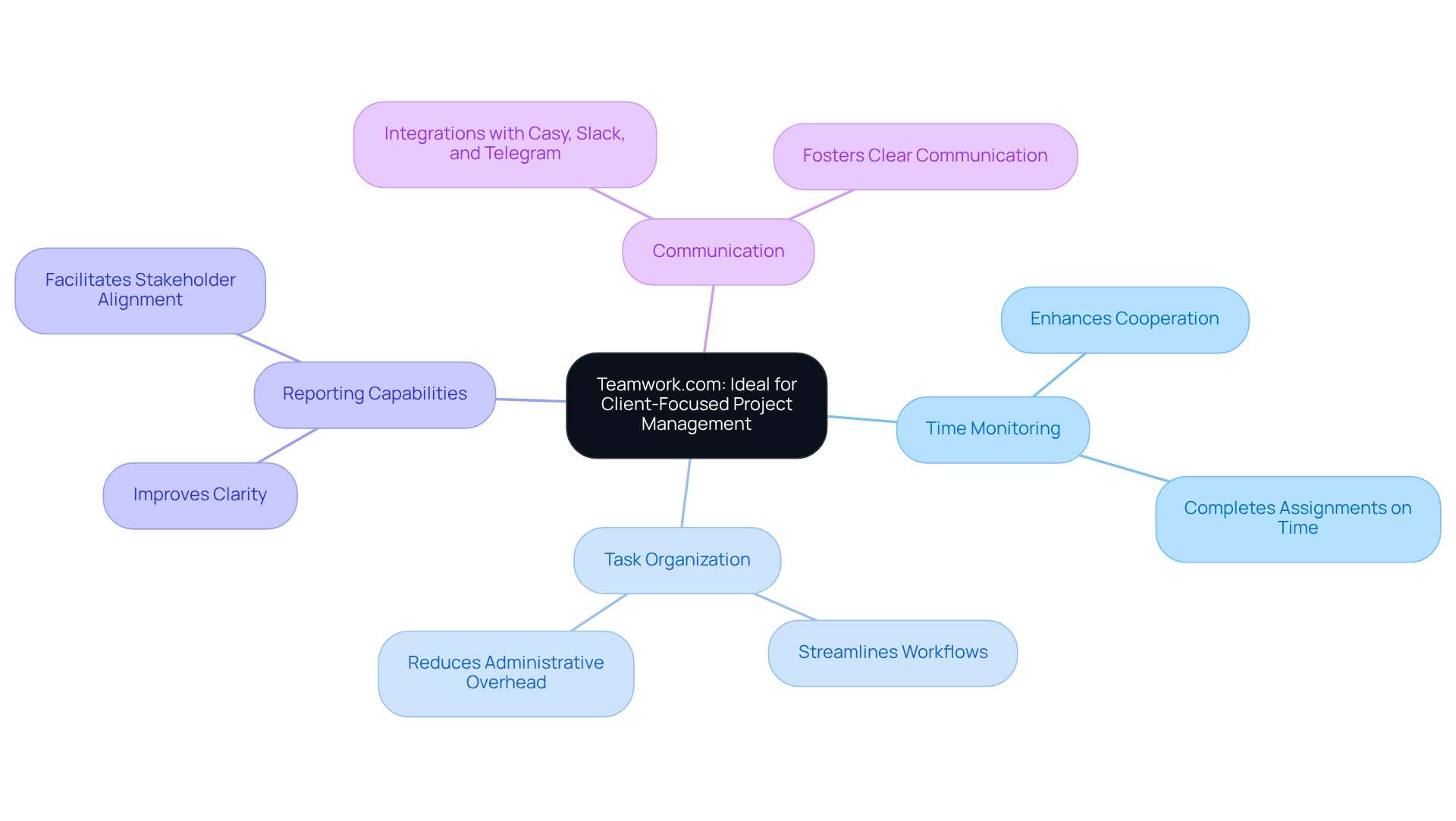
Airtable: Customizable Spreadsheet-Database Hybrid
Airtable stands out as one of the best Trello alternatives for organizing tasks, seamlessly blending the simplicity of spreadsheets with the power of databases. Teams can create custom workflows, track tasks, and manage initiatives through Airtable's flexible interface. Its ability to present information in various formats—such as grids, calendars, and Kanban boards—positions it as an exceptional choice for groups requiring flexibility in their processes.
In today’s fast-paced work environments, adaptability is essential. Organizations utilizing Airtable have reported remarkable productivity gains, with software for overseeing initiatives capable of enhancing efficiency by as much as 50% and cutting costs by up to 20%. Notably, 91% of groups indicate reliance on virtual tools for task management, underscoring the growing dependence on such solutions.
Airtable's customizable workflows empower groups to tailor their task processes to specific needs, making it an ideal solution for those seeking adaptability. As Howie Liu, the CEO of Airtable, aptly stated, "Organizations have enormous potential to transform the way they work with AI." With over 500,000 organizations supported by Airtable and 80% of Fortune 100 companies utilizing its platform, it clearly distinguishes itself as a premier choice for groups aiming to enhance collaboration and optimize operations. As the demand for hybrid task coordination tools continues to rise, Airtable's innovative features position it as a leading competitor among Trello alternatives in a market projected to reach $10 billion by 2026.
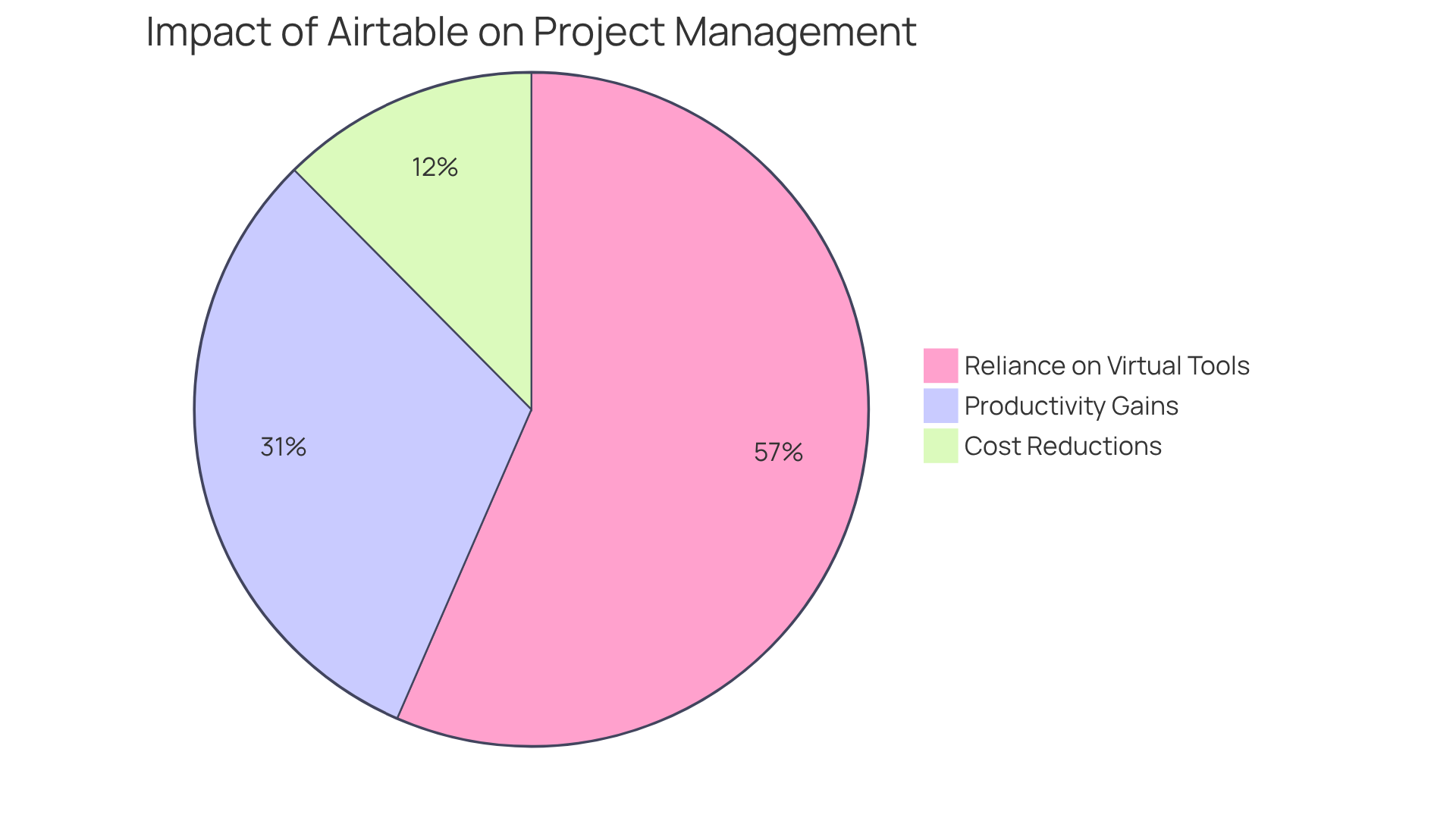
Jira: Agile Project Management for Software Development
Jira stands as a formidable tool for task oversight, expertly designed for agile software development teams. Its functionalities—spanning backlog management, sprint scheduling, and issue tracking—empower teams to navigate their tasks with precision. Recent enhancements, notably the integration of Jira Software and Jira Work Management, significantly bolster collaboration and streamline management processes.
With customizable workflows and sophisticated reporting tools, Jira equips teams to remain organized and focused on delivering high-quality software. Consider case studies showcasing automated workflows; they reveal how Jira effectively reduces administrative burdens, allowing teams to concentrate on critical tasks.
Additionally, Jira's mobile accessibility ensures that team members remain connected and productive, regardless of their location. By facilitating customizable permissions, Jira cultivates a secure environment that upholds data integrity.
In summary, Jira's robust features position it as an indispensable resource for software development teams eager to refine their process management.
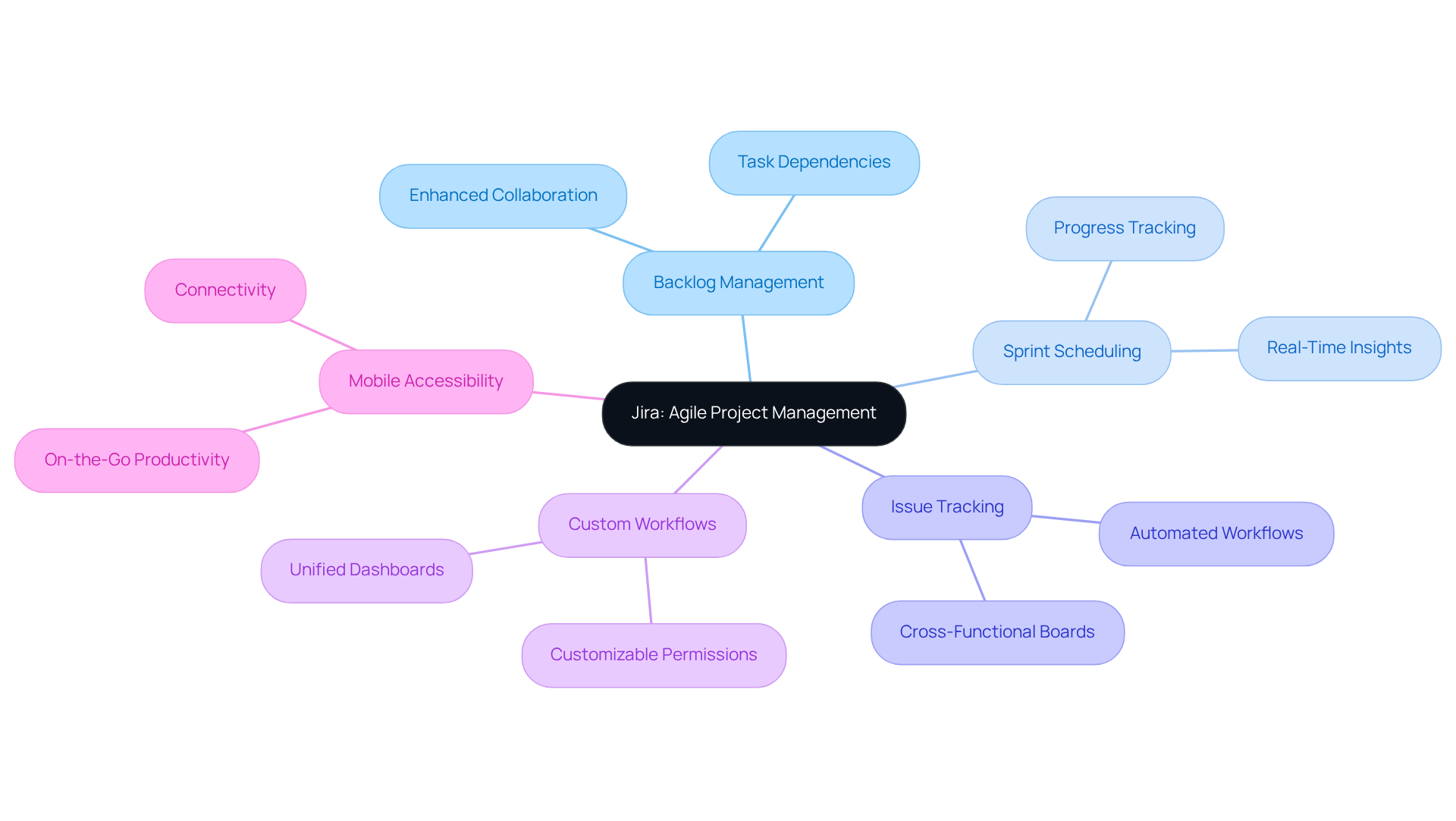
Basecamp: Simple Project Management for Startups
Basecamp serves as a powerful tool that streamlines collaboration specifically designed for startups and small groups. Its user-friendly interface allows teams to efficiently manage tasks, communicate effectively, and share files all in one centralized location. With a focus on essential features such as to-do lists and message boards, Basecamp stands out as an excellent option for groups aiming to simplify their processes without the burden of unnecessary complexity.
Recent trends highlight a growing demand for accessible planning solutions tailored to the unique needs of small groups. Basecamp's straightforward design not only meets this demand but positions itself as an ideal choice for those looking to enhance their management processes. Moreover, the platform's continuous updates further improve usability, ensuring that teams can swiftly adapt to changing requirements.
Case studies reinforce Basecamp's effectiveness in fostering collaboration among small groups. For instance, startups involved in the DMZ's Basecamp program have reported notable enhancements in task management and communication efficiency, underscoring the platform's pivotal role in supporting innovative projects. By utilizing Basecamp's intuitive features, teams can maintain their focus on core objectives, ultimately driving success in their entrepreneurial endeavors.
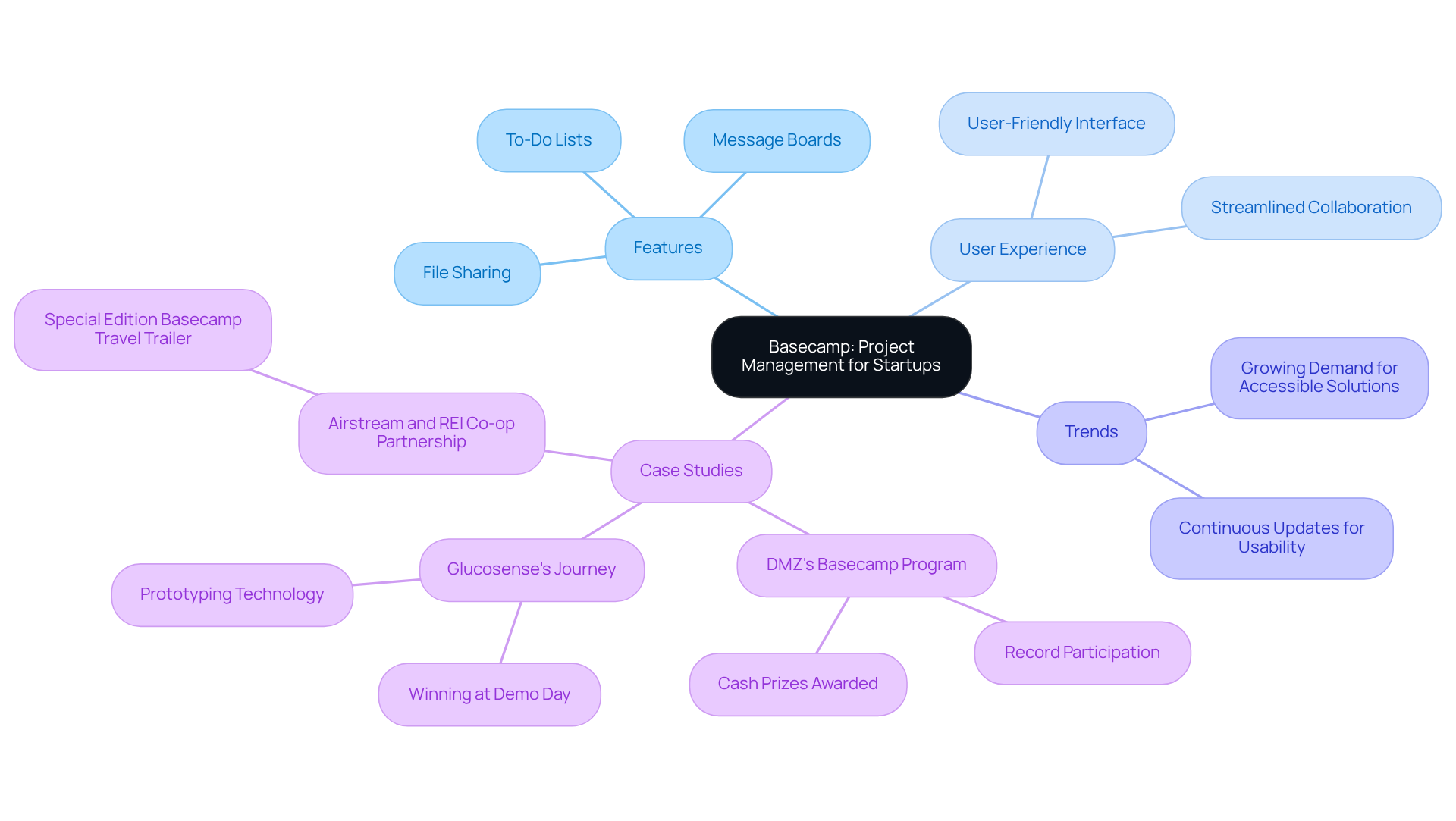
Conclusion
In exploring the landscape of project management tools, a wealth of alternatives to Trello emerges, each offering distinctive features aimed at enhancing productivity and streamlining workflows. From the automation capabilities of Casy to the flexibility of ClickUp and the user-friendly interface of Asana, these tools cater to diverse team needs and working styles. As organizations increasingly seek efficient solutions, understanding the strengths of each platform becomes crucial for making informed decisions that align with specific project requirements.
This article highlights key contenders such as:
- Monday.com
- Notion
- Wrike
- Teamwork.com
- Airtable
- Jira
- Basecamp
Each presenting unique advantages. Whether it’s advanced tracking in Wrike, customizable workflows in Airtable, or the simplicity of Basecamp for startups, these platforms facilitate not only task management but also foster collaboration, ensuring teams can navigate their projects with ease and efficiency.
In a rapidly evolving work environment, selecting the right project management tool is more critical than ever. The insights provided here serve as a guide for teams aiming to enhance their operational efficiency and achieve greater success. Embracing the capabilities of these Trello alternatives can transform workflows, reduce administrative burdens, and ultimately lead to improved project outcomes. Have you considered evaluating these options to find the best fit for your team's unique needs and aspirations?
Frequently Asked Questions
What is Casy and how does it work?
Casy is a project management tool that automates workflow management by integrating with chat platforms like Slack and Telegram. It captures key information from conversations to generate assignments and establish deadlines without manual input.
What are the benefits of using Casy?
Casy reduces administrative costs, enhances productivity, and allows teams to focus on core activities. Its built-in methodologies, such as OKRs and the Eisenhower Matrix, help teams prioritize tasks effectively.
In what environments is Casy particularly effective?
Casy is ideal for fast-paced environments such as game development and startups, where efficient task management and prioritization are crucial.
What features does ClickUp offer for project management?
ClickUp provides adaptable task management with features like Gantt charts, Kanban boards, and time tracking, allowing teams to customize workflows to their specific needs.
How does ClickUp enhance team collaboration?
ClickUp includes powerful collaboration tools that foster seamless communication among team members, making it suitable for organizations looking to improve task coordination.
What makes Asana a user-friendly project management solution?
Asana is known for its intuitive interface, which allows teams to easily develop initiatives, assign responsibilities, and set timelines, enhancing organizational capabilities.
What key features does Asana offer to maintain team focus?
Asana includes features such as dependencies and project schedules, which help teams stay aligned and focused on their objectives.
How has Asana improved its functionality recently?
Asana has introduced AI-driven functionalities like intelligent workflows and smart summaries, which automate routine processes and allow teams to concentrate on strategic initiatives.
Can you provide an example of Asana's effectiveness?
IPG Mediabrands reported that Asana empowered their 18,000 employees across 130 countries to streamline processes, leading to increased productivity and employee satisfaction.
How is Asana performing in terms of customer base and retention?
Asana has a growing customer base of 21,646 core clients, an 11% increase, and a dollar-based net retention rate exceeding 100%, indicating its effectiveness in meeting modern team demands.




